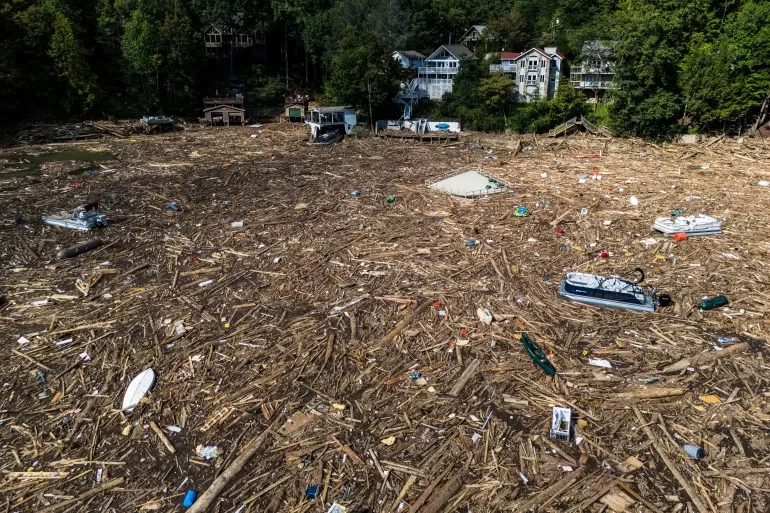Hurricane disinformation is causing such confusion after recent storms hit parts of the United States that federal emergency workers and meteorologists are having to take precautions after coming under threat from the public.
Forestry workers clearing tree damage were directed to stop working at the weekend in one area of western North Carolina hard hit by Hurricane Helene because of concerns over “armed militia” threatening government workers, the Washington Post reported, citing an email sent to federal agencies.
The Rutherford County Sheriff’s Office released a statement confirming that it had arrested an armed suspect for making threats against Federal Emergency Management Agency (FEMA) employees in North Carolina.
On Saturday, an official with the US Forest Service, which is supporting recovery efforts after Hurricane Helene along with FEMA, sent an urgent message to other agencies warning them to “stand down and evacuate the county immediately”.
The message stated that National Guard troops had come across trucks of armed militia “saying they were out hunting FEMA”.

The Rutherford County Sheriff’s Office released a statement confirming that it had arrested a 44-year-old white man armed with an assault rifle for making threats against FEMA employees near Lake Lure, one of the most devastated areas.
But it concluded that the suspect had acted alone and that there were no militia members targeting relief workers.
Due to the threat, the workers were forced to leave the area temporarily but were back at work on Sunday afternoon clearing trees and delivering supplies, the newspaper reported.
Death threats
Meteorologists in Washington, DC, and Houston, Texas were accused of helping in cover-ups and government manipulation related to hurricanes, The New York Times reported. And a forecaster for a television station in Michigan said she had received death threats.
“Murdering meteorologists won’t stop hurricanes,” the forecaster in Michigan, Katie Nickolaou, wrote in a social media post. “I can’t believe I just had to type that.”
Weather forecasters are usually scientists with degrees in meteorology. They sometimes face online abuse for raising the issue of climate change, which some people deny is happening.
Last year, Chris Gloninger, the chief meteorologist at a television news station in Iowa, quit his job after he received a death threat for his on-air discussions of climate change.
This year’s hurricane season has been especially tense, with the US election looming in three weeks.
After a slow start, the hurricane season erupted in October with two major hurricanes, Helena and Milton, which have wreaked havoc in Florida and North Carolina and killed more than 300 people.
“We’re all talking about how much more it’s ramped up,” Marshall Shepherd, director of the University of Georgia’s Atmospheric Sciences Program, told The New York Times. There has been “a palpable difference in tone and aggression toward people in my field,” he said.

Misinformation
In recent weeks, officials have complained that misinformation and rumours have made the recovery more difficult.
In North Carolina, hard-hit Rutherford County has become one of the centres of confusion after a rumour spread on social media that government officials planned to seize the devastated village of Chimney Rock and bulldoze bodies under the rubble.
On TikTok, conspiracies abound with bizarre claims that Helene was “geo-engineered” by the government to disrupt voting in Republican districts. There is no technology that can generate a storm, scientists pointed out.
The flurry of conspiracies about Helene is not only stirring confusion, but also undermining relief efforts, according to emergency responders and officials, including US President Joe Biden.
“This kind of rhetoric is not helpful to people,” FEMA Administrator Deanne Criswell told the ABC TV network on Sunday. “It’s really a shame that we’re putting politics ahead of helping people, and that’s what we’re here to do. We have had the complete support of the state.”
“Please stop this conspiracy theory junk,” Republican state Senator Kevin Corbin from North Carolina urged in a Facebook post on October 3. “It is just a distraction to people trying to do their job.”
So far, FEMA has sent $40m in relief funds to 30,000 North Carolina households and helped find shelter for thousands pushed out of their homes.
Its efforts are bolstered by about 1,500 active-duty soldiers deployed in the state along with $100m in federal funds allocated for road and bridge repairs.
Distress helpline
Authorities and news outlets have repeatedly refuted the claims that continue to circulate on the internet encouraging militias to resist FEMA.
FEMA has sought to push back on social media with its own frequent announcements of how to get assistance to hurricane survivors. The agency also offers an emotional “Disaster Distress Helpline” for survivors.
“It’s okay to not be okay after a hurricane. If you’re feeling overwhelmed, you’re not alone,” one FEMA announcement reads on social media. “Take care of yourself — you matter.”
Biden visited Florida at the weekend to see the destruction and pledge his support. “We’re doing everything we can,” he said.
